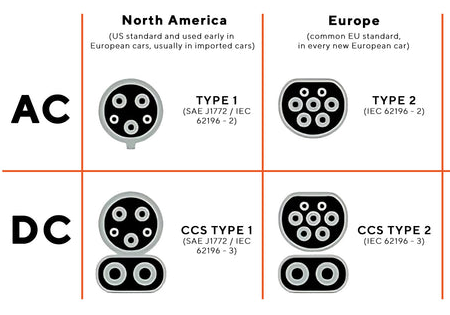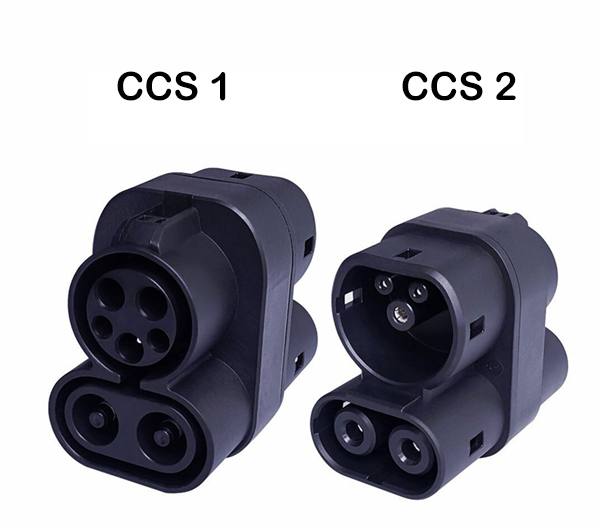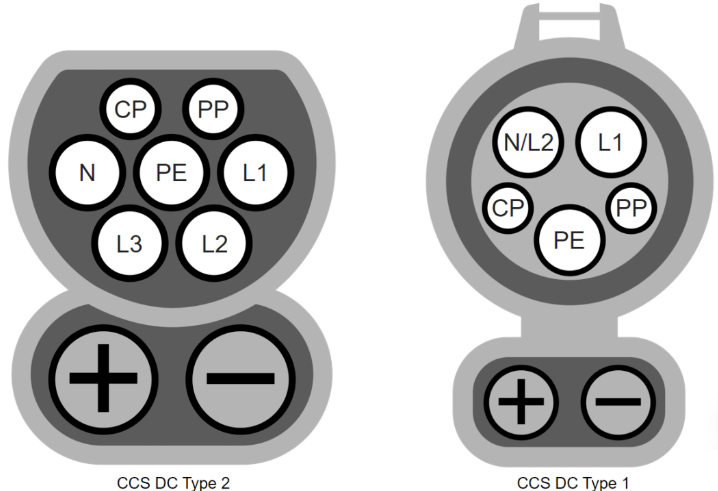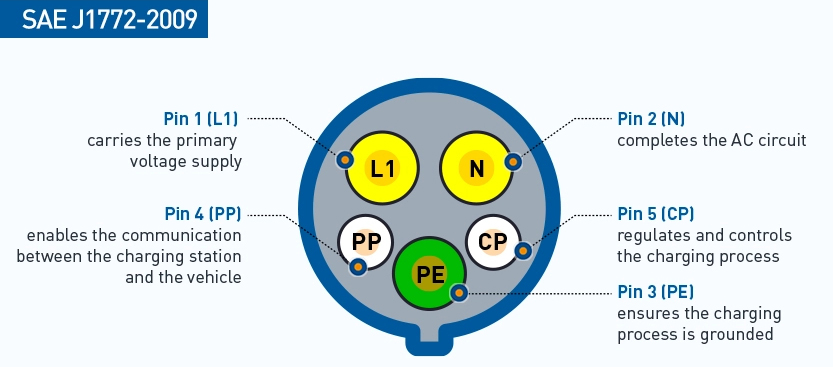The main difference between J1772, CCS1, and NACS lies in their power delivery. J1772 is for AC slow charging, CCS1 adds DC pins for fast charging, while NACS (Tesla) integrates both into a compact design. This guide analyzes their compatibility and future adoption.
With the rapid global adoption of EVs, this guide focuses on the complex, evolving North American charging ecosystem. We integrate current technical specifications and critical engineering deployment insights derived from industry bodies (SAE, CharIN), and authoritative data sources (DOE, NREL), focusing on SAE J1772 and ISO 15118 standard documents. The analysis rigorously examines the technical specifications, compatibility boundaries, and future trends, aiming to provide an Original analysis through the lens of protocol interoperability.
Table Of Contents
1. What is CCS Charging?

CCS (Combined Charging System) is a versatile EV charging standard widely used in Europe and previously the dominant fast-charging standard in North America. It supports both AC (Alternating Current) and DC (Direct Current) charging through a single connector, offering great flexibility to users. The CCS connector combines standard AC charging pins (such as J1772 in North America or Type 2 in Europe) with two additional DC pins, enabling both slow AC charging and high-speed DC fast charging through the same port.
Advantages of CCS:
• Multi-functional Charging: Supports both AC and DC charging, suitable for home and public charging.
• Fast Charging: DC fast charging can typically charge a battery to 80% in under 30 minutes, significantly reducing charging time.
• Wide Adoption: Adopted by major automakers and integrated into an increasing number of public charging stations.
As the mandatory standard in the European Union, CCS2 remains the dominant DC fast-charging connector. According to the European Alternative Fuels Observatory (EAFO) data (Q4 2024), the vast majority (approximately 85% to 90%) of public charging points utilize Type 2 (AC) or CCS (DC) connections. [ACEA Source]. Data from the U.S. Department of Energy (DOE) indicates that CCS remains the installed standard for the current fleet of non-Tesla vehicles in North America, even amidst the NACS transition [DOE-AFDC Source].

2. Which Vehicles Support CCS Charging?
CCS remains the fast-charging dominant standard globally, especially in Europe. In North America, most existing non-Tesla EVs (pre-2025 models) support CCS1, though many manufacturers have announced a transition to NACS ports starting in 2025.
Supported vehicles include:
• Volkswagen ID.4
• BMW i4 and iX series
• Ford Mustang Mach-E
• Hyundai Ioniq 5
• Kia EV6
These vehicles are compatible with most high-speed charging networks, providing a convenient experience for long-distance travel.
3. The North American Landscape Shift: CCS1 vs. SAE J3400 (NACS)
The North American market is currently defined by a competition between CCS1 (the regional CCS standard) and the North American Charging System (NACS), which has been standardized by the Society of Automotive Engineers (SAE) as SAE J3400。
This article provides an in-depth analysis of the current North American charging landscape, focusing on the technical specifications and on-the-ground deployment challenges of CCS1, J1772, and the ascending SAE J3400 (NACS) standard. We integrate insights derived from major charging network operators and automotive engineering documentation to compare charging types, physical compatibility, and long-term trends.
| Feature | CCS1 (Combined Charging System) | NACS / SAE J3400 (North American Charging System) |
|---|---|---|
| Connector Design | Larger, bulkier connector combining J1772 pins with two DC pins. | Smaller, lighter, and more ergonomic design; one pin set for both AC/DC. |
| Dominant Region | Europe (as CCS2) and previously North America. | North America (set to become the default standard). |
| Future Outlook | Will remain essential for the existing non-Tesla EV fleet and through adapters. | Major automakers are adopting it for new models starting in 2025/2026。 |
The standardization of the NACS connector as SAE J3400 provides a clear industry roadmap, ensuring interoperability and safety certification for its widespread adoption across North America.
4. What is J1772 Charging?
SAE J1772 is the standard AC (Alternating Current) charging connector in North America, primarily used for Level 1 (120V) and Level 2 (240V) charging. Developed by the Society of Automotive Engineers (SAE), it is compatible with nearly all EVs and plug-in hybrid electric vehicles (PHEVs) sold in North America.
Features of J1772:
• AC Charging Only: Suitable for slow charging at home or workplaces.
• Wide Compatibility: Supported by almost all EVs and PHEVs in North America.
• Home and Public Use: Commonly used in home charging setups and public AC charging stations.
Industry estimates suggest that over 80-90% of Level 2 home charging units sold in North America feature the J1772 connector, establishing it as the universal AC standard.Tesla owners can charge their vehicles at most public AC stations using a J1772 adapter. Additionally, a report by Electric Mobility Canada highlights the widespread reliance on J1772 by Nissan Leaf and Chevrolet Bolt EV owners for daily charging.
5. Which Vehicles Support J1772 Charging?
Most EVs and PHEVs in North America are equipped with J1772 connectors, making it the most broadly compatible standard for Level 1 and Level 2 charging.
Supported vehicles include:
• Tesla models (with an adapter)
• Nissan Leaf
• Chevrolet Bolt EV
• Toyota Prius Prime (PHEV)
The broad compatibility of J1772 makes it one of the most popular charging standards in North America.As the universal Level 2 (AC) standard, all non-Tesla EVs and PHEVs produced for the North American market (prior to the NACS transition, e.g., pre-2025/2026 models) are equipped with a J1772 port, making it a functional 100% compatibility standard for AC charging. Tesla’s use of J1772 adapters allows its vehicles to charge at nearly all public AC stations. Additionally, research by Electric Mobility Canada shows that Nissan Leaf and Chevrolet Bolt EV owners highly value the compatibility and ease of use of J1772.
6. Key Differences Between CCS and J1772
When choosing a charging standard, users should consider charging speed, compatibility, and use cases. Here are the main differences:
| Comparison | CCS (Combined Charging System) | J1772 (SAE J1772) |
| Charging Type | Supports AC (Level 2) and DC (Level 3) fast charging | AC charging only (Level 1 and Level 2) |
| Charging Speed | DC fast charging typically50 kW to 350 kW (under 30 minutes to 80%) | Level 2 charging up to 19.2 kW (4–8 hours for a full charge) |
| Connector Design | Larger, bulkier connector combining J1772 AC pins with two dedicated DC pins. | Compact AC charging connector for Level 1/2 only. |
| Communication Protocol | ISO 15118 (Power Line Carrier – PLC) for advanced features (e.g., Plug and Charge) | SAE J1772 (Pilot Signal) for basic charge control and safety interlocking. |
| Hardware Cost | (DCFC Unit): $10,000 to over $40,000 USD (for the 50–150 kW unit, excluding civil engineering) | Level 2 Home Units: Typically $300 – $1,000 USD for the hardware unit. |
| Use Cases | Home charging, long-distance travel, and high-speed public charging. | Home or workplace slow charging (overnight/daily parking). |
a. Charging Speed:
CCS and NACS support rapid DC fast charging, often ranging from 50 kW to 350 kW (depending on the station and vehicle architecture). J1772 is limited to Level 2 AC charging, with a maximum typical output of 19.2 kW.
b. Installation Cost & Complexity: While J1772 (Level 2) installation is comparable to wiring a large appliance ($300–$1,000 for hardware), DCFC (CCS/NACS) site deployment represents a significant engineering project. Total project costs (>$100,000 USD) are often dominated by utility grid upgrades, transformer costs, and specialized permitting—factors far exceeding the $10,000–$40,000 unit hardware cost.[NREL Cost Analysis].
c. Connector Design
CCS: Combines J1772 AC pins with two additional DC pins, making it slightly larger than a standard J1772 connector but allowing greater flexibility.
J1772: A more compact connector that supports AC charging exclusively.
d. Compatibility
CCS: Compatible with EVs designed for both AC and DC charging, especially beneficial for longer journeys requiring quick charging stops.
J1772: Universally compatible with all North American EVs and PHEVs for AC charging, widely used in home charging stations and public AC chargers.
e. Application
CCS: Ideal for both home charging and high-speed charging on the go, suitable for EVs that require fast charging options.
J1772: Primarily suited for home or workplace charging, best for overnight charging or settings where speed is not a critical factor.
f. Protocol Interoperability: SAE J3400 and ISO 15118
The CCS standard relies on ISO 15118 (specifically 15118-2/20 for PLC over the Control Pilot line) to enable secure features like Plug and Charge (P&C). Crucially, the SAE J3400 standard is explicitly specified to be electrically compatible with the ISO 15118 protocol via PLC. This means NACS-equipped vehicles can support P&C and V2G (Vehicle-to-Grid) features, provided that the charging station's backend and firmware are updated to fully implement the ISO 15118 protocol handshake for the J3400 connector. This interoperability is key to a seamless transition.
[Visual Aid Note] See Figure 1 for J1772 vs. CCS1 Connector Pinouts

7. Frequently Asked Questions
1.Can J1772-only vehicles (AC) charge at a CCS station?
No, not directly for DC fast charging. While the upper half of a CCS port is the J1772 port, public DC fast charging stations only provide the full CCS (DC) gun. A J1772-only vehicle cannot utilize the high-power DC pins.
2.Are CCS chargers widely available at public charging stations?
Yes. CCS chargers (CCS1/CCS2) are common globally. In North America, the network is extensive, and many stations are adding NACS connectors alongside CCS1 for future compatibility.
3.Do Tesla vehicles support CCS or J1772?
Tesla vehicles natively use the NACS connector. They can charge at J1772 (AC) stations using an adapter, and they can also access the CCS DC fast-charging network using a manufacturer-provided CCS adapter.
4.Which is faster: CCS or J1772?
CCS and NACS (J3400) are significantly faster than J1772. This is because CCS and NACS support Level 3 DC fast charging, whereas J1772 is limited to Level 1/2 AC slow charging.
5.What is the charging power of a J1772 charger?
J1772 chargers typically support Level 1 (120V, 1.4-1.9 kW) and Level 2 (240V, 3.3-19.2 kW) charging.
6.What is the maximum charging power of a CCS charger?
CCS chargers typically support power levels ranging from 50 kW to 350 kW, depending on the charging station and vehicle.
7.What is the typical hardware cost for J1772 and CCS/NACS chargers?
J1772 Level 2 units typically cost $300 – $1,000 USD (excluding residential wiring). DCFC (CCS/NACS) units (50–150 kW) typically cost $10,000 – $40,000+ USD (for the hardware unit only). Note: DCFC total project costs often exceed $100,000.
8.Will CCS1 be phased out in North America?
CCS1 is in a transition period. While most automakers have committed to NACS ports starting in 2025/2026, CCS1 will remain crucial for the millions of existing non-Tesla EVs for years. Charging networks are moving toward dual-port (CCS1 + NACS) stations.
8.Future Trends and User Recommendations
As the EV market continues to grow, the charging landscape is becoming clearly segmented by region and use case:
•Global Standard: CCS2 remains the non-Tesla standard across Europe and other major global markets.
•North America: SAE J3400 (NACS) is rapidly becoming the dominant new standard for passenger vehicle fast charging, backed by almost all major automakers. CCS1 will remain crucial during the transition period.
•Home Charging: SAE J1772 (Level 2) will continue to dominate the low-cost, slow-charging home and workplace market due to its universality and simplicity.
For consumers, the choice depends on location. In Europe, CCS2 compatibility is mandatory. In North America, choosing a vehicle with native NACS (J3400) is the best way to future-proof your investment, while current non-Tesla owners must rely on the existing CCS1 network and adapters for Supercharger access. The trend is toward dual-port charging stations to serve both the current CCS fleet and the future NACS fleet.
Post time: Oct-31-2024




